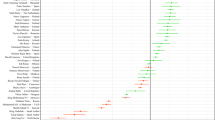Abstract
The political statements of 12 prominent politicians involved in the 1998 Good Friday Agreement were examined using Diction (Hart, 1984a & 1995), a text analysis program that yields five measures of language variability: Optimism, Activity, Realism, Commonality, and Certainty. It was predicted that multi-dimensional scaling (MDS) would indicate that three of these variables could be used to group the politicians on the basis of their published policy positions. MDS indicated that the language of the politicians could be plotted on two dimensions. Activity, with an angle of 31.8°, and Optimism, with an angle of 35.9°, represent the first dimension. Realism loaded significantly on Dimension 2 which has an angle of 42.2°. Limitations of text analysis programs are considered together with suggestions for future developments.
Similar content being viewed by others
References
Alexa, M. (1997). Computer assisted text analysis methodology in the Social Sciences. ZUMA Arbeitsbericht, 97/07. Mannheim: ZUMA.
Allport, G.W., & Odbert, H.S. (1936). Trait names: A psycho-lexical study. Psychological Monographs, 47, No. 211.
Aughey, A., & Morrow, D. (1996). Northern Ireland politics. London: Sage.
Bew, P., Patterson, H., & Teague, P. (1997). Between war and peace: The political future of Northern Ireland. London: Lawrence & Wishart.
Borg, L., & Groenen, P. (1997). Modern Multidimensional Scaling: Theory and Applications. New York: Springer.
Buckley, A.D. (1998). Daring us to laugh: Creativity and power in Northern Irish symbols. In A.D. Buckley (Ed.), Symbols in Northern Ireland. Belfast: Queens University Belfast.
DeVries, M. (1999). Computer based content analysis of party manifestos of the 1998 Dutch elections. Paper presented at the workshop on Estimating policy positions of political actors. Mannheim: ECPR Joint Sessions.
Elliott, S., &Flackes, W.D. (1999). Northern Ireland a political directory, 1968–1999. Belfast: Blackstaff.
Eysenck, H.J. (1954). The psychology of politics. London: Routledge & Kegan Paul.
Goldstein, J.S., Pevehouse, J.C., Gerner, D.J., and Telhami, S. (2001). Reciprocity, triangularity, and cooperation in the Middle East, 1979-97. Journal of Conflict Resolution, 45, 594–620.
Graber, D.A. (1976). Perceptions of Middle East conflict in the UN, 1953–1965. Journal of Conflict Resolution, 13, 454–484.
Hart, R. (1984a). Verbal style and the presidency: A computer-based analysis. New York: Academic Press.
Hart, R. (1984b). Systematic analysis of political discourse. In K.R. Sanders (Ed.), Political communication yearbook. Carbondale: Southern Illinois University Press.
Hart, R. (1997). Diction 4.0. The text-analysis program user’s manual. Texas: Scolari.
Hart, R. (2001). Redeveloping DICTION: Theoretical considerations. In M. West (Ed.), Theory, Method, and Practice of Computer Content Analysis. New York: Ablex.
Hart, R., & Jarvis, S. (1997). Political debate: Forms, styles and media. American Behavioral Scientist, 40, 1095–1122.
Hart, R., & Jennings, W. (2000). Assessing political vocabularies: a Diction-based analysis of the Aspen transcripts. Austin: Strauss Institute for Civic Participation.
John, O.P, Angleitner, A., & Ostendorf, F. (1988). The lexical approach to personality: A historical review of trait taxonomic research. European Journal of Personality, 2, 171–203.
Kruskal, J., & Wish, M. (1978). Multidimensional scaling. London: Sage.
Laver, M., & Garry, J. (2000). Estimating policy positions from political texts. American Journal of Political Science, 44, 619–634.
Pennebaker, J.W. & King, L.A. (1999). Linguistic styles: Language use as an individual difference. Journal of Personality and Social Psychology, 77, 1296–1312
Pennebaker, J.W., Matthias, R.M., & Niederhoffer, K.G. (2003). Psychological aspects of natural language use: our words, our selves. Annual Review of Psychology, 54, 547–577.
Salazar, C. (1998). Identities in Ireland. History, ethnicity, and the nation-state. European Journal of Cultural Studies, 1, 369–385.
Schroder, H., Driver, M.J., & Streufert, S. (1967). Human information processing. New York: Holt, Rinehart, & Winston Inc.
Stalans, L. (1997). Multidimensional scaling. In L. Grimm & P. Yamold (Eds.), Reading and understanding multivariate statistics. Washington: American Psychological Association.
Suedfeld, P., Corteen, R., & McCormick, C. (1986). The role of integrative complexity in military leadership: Journal of Applied Social Psychology, 76,498–507.
Suedfeld, P., & Rank, A. D. (1976). Revolutionary leaders: Long-term success as a function of changes in conceptual complexity. Journal of Personality and Social Psychology, 34, 169–178.
Suedfeld, P. & Tetlock, P.E., (1977). Integrative complexity of communications in international crisis. Journal of Conflict Resolution, 27,169–186.
Suedfeld, P., Tetlock, P.E., & Ramirez, C. (1977). War, peace and integrative complexity. Journal of Conflict Resolution, 27,427–442.
Tetlock, P.E. (1981). Preto post election shifts in presidential rhetoric: Impression management or cognitive adjustment? Journal of Personality and Social Psychology, 41, 207–212.
Tetlock, P.E. (1983). Cognitive style and political ideology. Journal of Personality and Social Psychology, 45, 118–126.
Wallace, M.D., Suedfeld, P. & Thachuk, K. (1993). Political rhetoric of leaders under stress in the gulf crisis. Journal of Conflict Resolution, 37, 94–107.
Whyte, J. (1990). Interpreting Northern Ireland. Oxford: Claredon.
Author information
Authors and Affiliations
Rights and permissions
About this article
Cite this article
Forsythe, A.M. Mapping the political language of the 1998 good friday agreement. Curr Psychol 23, 215–224 (2004). https://doi.org/10.1007/s12144-004-1021-2
Issue Date:
DOI: https://doi.org/10.1007/s12144-004-1021-2




